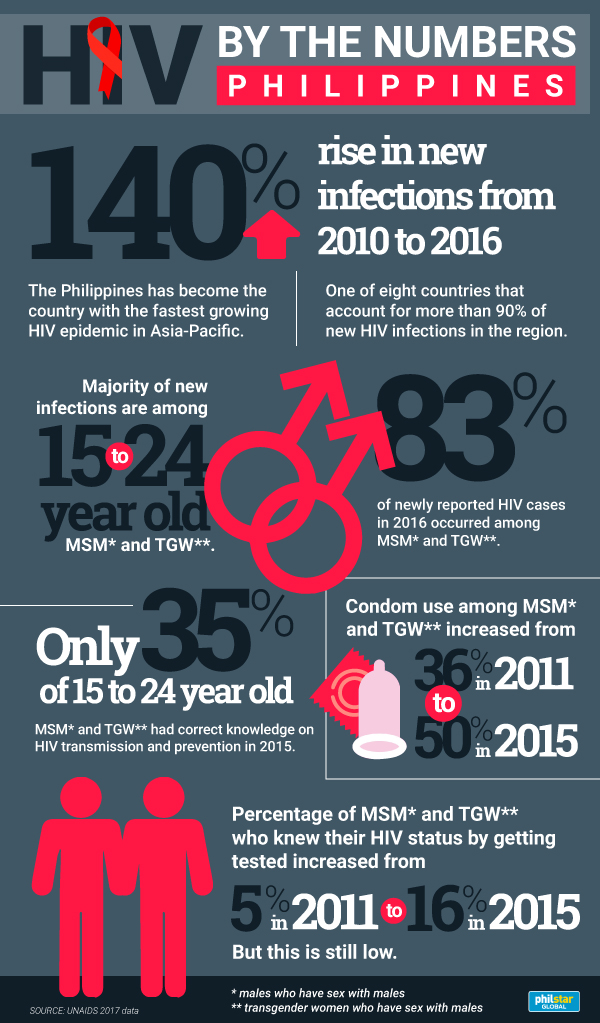'National emergency': Philippines urged to address HIV epidemic
August 2, 2017 | 7:40am

The UNAIDS report showed a 140-percent increase in new infections in the Philippines. Also alarming was the low rate of correct knowledge on HIV transmission and prevention among the key at-risk population. File
MANILA, Philippines — The Human Rights Watch Wednesday has called on the Philippine government to implement proven low-cost and low-tech interventions after a 2017 UNAIDS report found that the country has the fastest growing HIV epidemic in Asia-Pacific.
The UNAIDS report showed a 140-percent increase in new infections in the Philippines from an estimated 4,300 cases in 2010 to an estimated 10,500 in 2016. The Philippines is one of eight countries that account for more than 90 percent of new HIV infections in the region.
Dr. Rossana Ditangco, head of the AIDS Research Group of the Research Institute for Tropical Medicine, said Monday it is time for the government to "treat HIV as a national emergency."
"I don’t have high hopes anymore. We can’t control the rapid rise of HIV infection," she said.
Health Secretary Paulyn Jean Rosell-Ubial said addressing the country’s HIV epidemic is "one of the top health priorities."
She also said there are plans to increase funding for antiretroviral treatment and to “scale up” the Health department's community-based HIV screening. She said they would do this by promoting testing and other services such as risk-reduction and HIV awareness counseling in areas with high numbers of new infections.
The DOH provides free antiretroviral medicine to those who test positive for the virus. They also cover expenses of up to P 30,000 a year per person for other out-patient services.
There are three HIV treatment hubs in Metro Manila: the RITM, San Lazaro Hospital and Makati Medical Center.

Although the HRW commended the Duterte administration's plan to increase the funding for antiretroviral treatment, the group lamented the delay in rolling out more practical and cost-efficient approaches, such as the removal of obstacles to condom access and usage and inclusion of safer sex and HIV prevention education in the school curriculum.
In 2016, 83 percent of newly reported HIV cases occurred among males who have sex with males or MSM and transgender women who have sex with males or TGW.
Majority of new infections were among 15- to 24-year-old MSM and TGW. Alarming, however, was the low rate of correct knowledge on HIV transmission and prevention among these key at-risk population.
The UNAIDS found that in 2015 only 35 percent of 15- to 24-year-old MSM and TGW know how the virus is transmitted and prevented. The percentage of MSM and TGW who knew their HIV status by getting tested also remains low at 16 percent in 2015 from 5 percent in 2011.
"The Philippines government needs to demonstrate it’s finally willing to adequately address [the HIV epidemic]," the New York-based group said.
Stigma and discrimination
In its report published in December last year, the HRW said current government policies as well as the long standing objections of the Catholic church "create obstacles to condom access and HIV testing and limit educational efforts on HIV prevention."
"In the Philippines, condoms are readily available for retail sale at pharmacies and convenience stores. However, a legal restriction embodied in the Responsible Parenthood and Reproductive Health Act of 2012 (Republic Act No. 10354, known as the RH Law) prohibits condom purchases by individuals under the age of 18 without parental consent. As a result, retail store employees routinely refuse to sell condoms to youths or demand that they provide identification proving their age, which can be off-putting even for those over 18," the report said.
"Human Rights Watch spoke to many people with HIV age 18 to 35 who described their unease when buying condoms. Although the government provides free condoms at public social hygiene clinics (SHCs), which provide no-cost contraceptive supplies and family planning services, many Filipinos will not visit SHCs because they carry a social stigma related to their outreach activities for commercial sex workers," it added.
The group said the government must also reactivate, especially in Cebu City, its harm reduction programs which are focused on preventing the spread of HIV through injectable materials such as needles, syringes and other drug preparation equipment. Cebu City, the country's second largest city, recorded the highest prevalence of HIV among MSM population based on the 2015 data of the DOH.
"Likewise, the government needs to step up its efforts to eliminate stigma and discrimination, which are key factors in discouraging or preventing key affected populations being tested or treated," the HRW added. — Mikas Matsuzawa and Elizabeth Marcelo
BrandSpace Articles
<
>
Philstar
x
- Latest
- Trending
Trending
Latest
Trending
Latest
Recommended



























